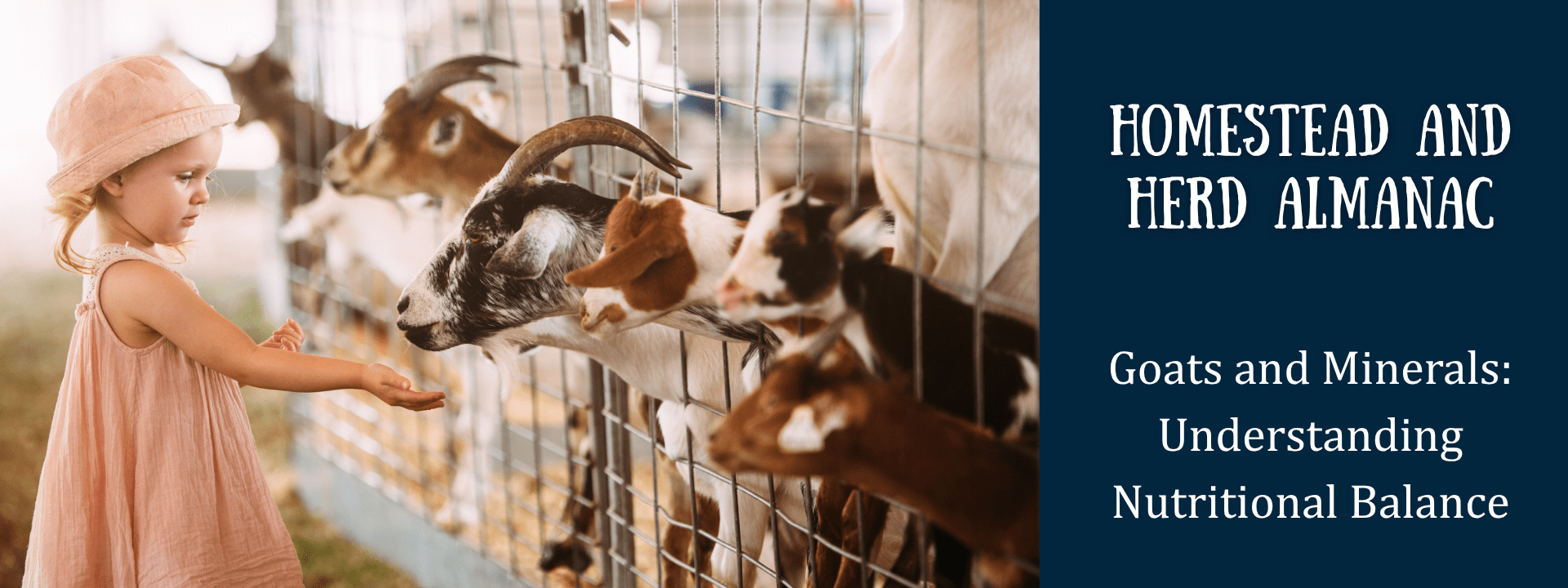
Goats and Minerals: Understanding Nutritional Balance
Minerals play a vital role in maintaining the health, growth, and productivity of goats. They support bone development, muscle and nerve function, immune strength, reproduction, and milk production. Because forages and feed ingredients can vary widely in mineral content, providing goats with access to a balanced mineral supplements is essential for overall herd health.
Major and Trace Minerals
Minerals are divided into two main categories based on how much the body requires:
Major Minerals:
Calcium (Ca), Phosphorus (P), Magnesium (Mg), Potassium (K), Sodium (Na), Chlorine (Cl), and Sulfur (S).
Trace Minerals:
Iron (Fe), Iodine (I), Copper (Cu), Manganese (Mn), Zinc (Zn), Cobalt (Co), Molybdenum (Mo), Selenium (Se), and others in smaller quantities such as Chromium, Tin, Vanadium, Fluorine, Silicon, Nickel, Arsenic, and Lead.
Key Minerals and Their Roles
Calcium (Ca)
Roughly 99% of calcium is stored in the bones and teeth, serving as the primary structural element and mineral reserve. The remaining calcium supports nerve transmission, muscle contraction and blood clotting. Calcium is absorbed primarily in the small intestine.
Deficiency: Can lead to milk fever (hypocalcemia) around kidding, causing weakness, ataxia, and decreased feed intake.
Excess: May contribute to urinary calculi if the calcium-to-phosphorus (Ca:P) ratio is imbalanced
Phosphorus(P)
About 75-85% of phosphorus is found in bones, with the rest involved in energy metabolism, enzyme activation, and cell division.
Deficiency: Causes reduced feed intake, poor growth, stiffness, and lethargy.
Excess: Can contribute to urinary calculi; maintaining a Ca:P ratio above 2.5:1 helps prevent this.
Magnesium (Mg)
Around 60-70% of magnesium is found in the bones, with the rest in soft tissues and body fluids. It supports nerve and muscle function and activates many metabolic enzymes.
Deficiency: Leads to grass tetany (hypomagnesemia), particularly when high potassium or ammonium levels interfere with absorption. Symptoms include staggering, convulsions, and sudden death.
Potassium (K) and Sodium (Na)
Potassium is primarily found inside cells, while sodium is mainly outside cells. Together, they regulate osmotic pressure, acid base balance, and nerve function.
Deficiency: Rare in goats, but sodium deficiency can cause poor growth, dull hair coats, and reduced milk production.
Excess: Diets excessively high in potassium may contribute to hypocalcemia and lower calcium absorption.
Important Trace Minerals
Iron (Fe)
Iron is stored in the liver, spleen, and bone marrow and is critical for oxygen transport and immune function.
Deficiency: Rare in adults, but can occur in kids due to low iron levels in milk or heavy parasitism, leading to anemia.
Iodine (I)
Iodine levels in forages depend on soil content.
Deficiency: Results in goiter (enlarged thyroid), weak or small kids, poor reproductive performance, and reduced growth.
Copper (Cu)
Copper is essential for enzyme activity, pigment formation, and immune health. It is absorbed in the small intestine and stored in the liver.
Deficiency: Leads to faded hair color, poor growth, anemia, infertility, and greater parasite susceptibility.
Note: Copper deficiency is often linked to high dietary molybdenum or sulfur levels, which inhibit absorption.
Zinc
Zinc supports skin and hoof health, reproduction, and hormone function.
Deficiency: Causes rough coats, joint stiffness, reduced fertility, and parakeratosis (skin thickening). High dietary calcium may worsen zinc deficiency.
Selenium (Se) and Cobalt (Co)
Selenium acts as an antioxidant and supports fertility and immunity, while cobalt is needed for vitamin B12 synthesis, aiding in red blood cell formation and energy metabolism.
Selenium Deficiency: Can lead to white muscle disease, weak kids, retained placenta, and mastitis.
Cobalt Deficiency: Reduces fertility and causes poor appetite and slow growth.
Management Tip: Both copper and cobalt are available in slow-release boluses for goats – copper aids parasite control, and cobalt supports reproduction and vitality.
Balancing Minerals in the Goat Diet
Free-choice mineral supplements are always recommended for goats. Because mineral levels in forages can fluctuate due to soil type, plant maturity, and growing conditions, having minerals available ensures goats can self-regulate intake to meet their needs.
When choosing a mineral supplement:
- Select one formulated specifically for goats, but not other livestock.
- Ensure proper Ca:P ratios (2:1 to 2.5:1)
- Provide loose, free-choice minerals rather than blocks – goats tend to under-consume block forms.
- Offer fresh water at all times, as mineral intake influences water consumption.
Mineral nutrition is the foundation of goat health. Deficiencies or imbalances can impact growth, reproduction, and disease resistance. A well-balanced mineral program, along with quality forage and sound management, helps ensure productive, healthy goats and long-term herd success.
Kaniksu Feeds is dedicated to supporting producers with quality nutrition resources and mineral products designed to meet the specific needs of goats and other livestock.
